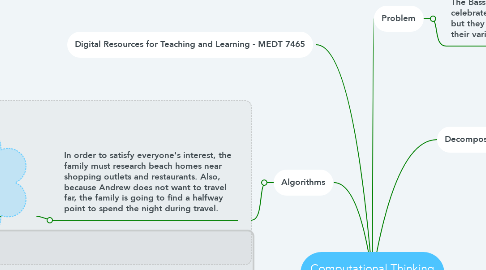
1. Abstractions
1.1. Because all of the family members wanted to enjoy being in nature and three specifically mentioned the beach. The family came to a consensus on a beach home in Florida. Because of the collective interest in eating and shopping, they have to find one near shopping outlets and restaurants.
1.1.1. Rationale: Abstraction is explained as “focusing only on the important details, while ignoring irrelevant information” (“Introduction to Computational Thinking,” 2020). My main focus with this step was focusing on the outcome of the key similarities which included the majority of the family being okay with traveling to Florida, eating, and shopping.
2. Algorithms
2.1. In order to satisfy everyone's interest, the family must research beach homes near shopping outlets and restaurants. Also, because Andrew does not want to travel far, the family is going to find a halfway point to spend the night during travel.
2.1.1. Rationale: “Algorithms focus on simple steps or rules to solve each of the smaller problems can be designed” (“Introduction to Computational Thinking,” 2020). So, since Andrew did not want to travel far, but the majority was okay with Florida, this step involved accommodating travel plans to satisfy him.
3. Digital Resources for Teaching and Learning - MEDT 7465
4. Problem
4.1. The Bass family wants to take a vacation to celebrate their mother Sissy's 60th birthday, but they aren't sure where to go because of their various preferences.
5. Decomposition
5.1. The family must discuss what each member enjoys doing on vacation and their destination of interest. Andrea does not want to travel far and enjoys the beach, nature, and good eating places. She wants to go either Florida or South Carolina. Antonio does not mind the travel and enjoys the beach and great shopping places. He is neutral about the location. Andrew does not want to travel far and enjoys nature, eating, and shopping. He prefers Texas because it is closer to home. Sissy does not mind the travel and enjoys good eating places and the beach. She wants to go to Florida.
5.1.1. Rationale: Curzon et al. (2014) describes decomposition as a way of separating the problem into parts for evaluation purposes. So, I broke down the different elements that are key to the vacation including desired destinations and amenities.
6. Pattern Recognition
6.1. After discussing what the family members were interested in doing and where they were interested in going. They concluded that all of the family members enjoy nature to some extent. Andrea, Antonio, and Sissy all enjoy the beach. Florida was on Andrea and Sissy's interest list, and Antonio was neutral. Both Andrea and Andrew don't want to travel far. Florida is close to Andrea who lives in Georgia, but far from the other family members who are in Arkansas. However, Antonio and Sissy don't mind traveling far.
6.1.1. Rationale: Pattern recognition is looking for similarities among and within problems (“Introduction to Computational Thinking,” 2020). Therefore, I analyzed the similarities of interests of the family members based on where they wanted to go and what they wanted to do while there.

